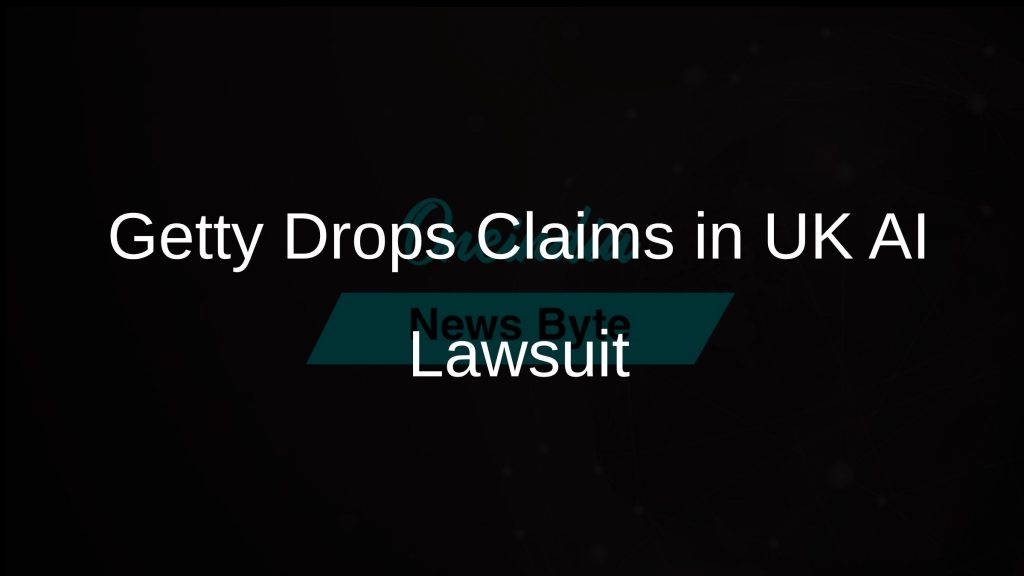International
-Sathish Raman

Getty
Images
has
decided
to
drop
its
copyright
infringement
claims
against
Stability
AI
in
a
significant
legal
case
at
Britain’s
High
Court.
This
decision,
made
as
closing
arguments
began,
removes
a
crucial
element
from
Getty’s
lawsuit
against
the
AI
company.
Stability
AI
owns
Stable
Diffusion,
a
popular
AI
image-making
tool.
The
case
is
being
closely
watched
due
to
its
potential
impact
on
the
creative
and
technology
sectors.

image
Getty
initially
accused
Stability
of
infringing
on
its
intellectual
property
rights,
including
copyright,
trademark,
and
database
rights.
However,
the
company
has
now
chosen
to
focus
on
trademark
infringement
and
secondary
copyright
infringement
claims.
This
shift
suggests
Getty
doubted
the
success
of
its
copyright
allegations
in
the
UK.
AI
Training
Practices
Under
Scrutiny
Tech
companies
often
train
their
AI
systems
using
vast
amounts
of
online
writings
and
images.
Getty
was
among
the
first
to
challenge
this
practice
with
lawsuits
in
both
the
US
and
UK
earlier
this
year.
The
trial
evidence
highlighted
the
creative
work
of
photographers
whose
images
are
part
of
Getty’s
collection,
contrasting
them
with
AI-generated
outputs
from
Stability.
The
UK
case
faced
challenges
partly
due
to
technicalities.
Although
Stability
is
based
in
London,
its
AI
training
occurred
elsewhere
on
Amazon’s
US-based
computers.
Proving
a
UK
connection
was
difficult
since
most
training
took
place
in
the
US,
according
to
AI
legal
expert
Alex
Shandro.
Legal
Challenges
for
Creative
Industries
This
week
marked
another
setback
for
creative
industries
challenging
generative
AI
practices.
In
the
US,
a
California
judge
ruled
that
Anthropic
didn’t
break
laws
by
training
its
chatbot
Claude
on
copyrighted
books
but
will
face
trial
for
sourcing
them
from
pirate
sites
instead
of
purchasing
them.
Getty
continues
to
accuse
Stability
of
trademark
infringement
because
its
AI
model
was
trained
on
images
with
Getty’s
watermarks,
sometimes
reproduced
by
the
image
generator.
Despite
training
outside
Britain,
Getty
argues
that
Stability
still
faces
local
laws
if
its
models
produce
images
in
the
UK.
Strategic
Decisions
and
Future
Implications
Shandro
noted
that
dropping
part
of
its
UK
complaint
might
be
strategic
for
Getty
to
focus
on
a
similar
pending
US
copyright
claim.
Stability
welcomed
Getty’s
decision
to
drop
multiple
claims
post-testimony.
“We
are
pleased
to
see
Gettys
decision
to
drop
multiple
claims
after
the
conclusion
of
testimony,” said
Stability
in
a
statement.
Nina
O’Sullivan
from
Mishcon
de
Reya
highlighted
that
how
the
judge
addresses
remaining
claims
could
impact
how
the
UK
handles
AI
tools
lawfully
trained
in
the
US.
Closing
arguments
are
expected
to
conclude
by
week’s
end,
with
a
written
judgment
anticipated
later.
The
outcome
of
this
case
could
influence
future
legal
approaches
towards
AI
training
practices
and
intellectual
property
rights
across
borders.
With
inputs
from
PTI


